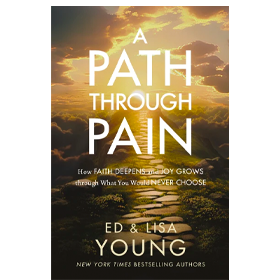 By Ed and Lisa Young
By Ed and Lisa Young
The problem of pain is perhaps the most profound question many of us raise against Christianity. How could a good God—a loving God—allow so much pain and suffering in the world?
All God would have to do is move the geological plates a few inches and we wouldn’t have tsunamis or earthquakes. All he would have to do is eradicate the cells that attack our bodies and cause cancer and other horrendous diseases. Why doesn’t he do those things? Why doesn’t God stop it all? How can we trust God, considering how painful life is? How could our pain have any significance?
These are huge questions—and great questions. They’re questions we’ve both asked God, and I’m sure you have as well. And yet the apostle Paul talks about pain being fundamental in the life of a Christ follower. He wrote, “Since we are his children, we are his heirs. In fact, together with Christ we are heirs of God’s glory. But if we are to share his glory, we must also share his suffering. Yet what we suffer now is nothing compared to the glory he will reveal to us later” (Romans 8:17–18 NLT).
As loyal followers of Jesus, we are liberated from the controlling power of sin and death. We are God’s children, part of his family, and we wait in expectation of a pain-free forever in heaven with our living Lord! That is our incredible inheritance.
However, the world has not yet been liberated from the controlling power of sin and death. Sin still wreaks havoc in our world, bringing death, decay, and dysfunction—from the smallest cells in our bodies to the leadership of the largest countries. The growing effects of sin lead to evil and suffering that God allows but does not cause.
Paul goes on to explain that pain is woven into the very nature of creation itself: “The creation was subjected to frustration, not by its own choice, but by the will of the one who subjected it, in hope that the creation itself will be liberated from its bondage to decay and brought into the freedom and glory of the children of God” (Romans 8:20–21 NIV).
Wait a minute, wait a minute. Creation was subjected to frustration by the will of the one who subjected it? Why does Paul say that? If we go back to the creation story in Genesis, the first book of the Bible, we read that God gave his great gift of life and relationship to Adam and Eve. They lived in perfect harmony with God for a while, but then they rebelled.
That’s when sin entered the equation, and God allowed frustration to collide with creation. Why? Because he gave us free will. Frustration is the result of sin, a result of our free will, and it ushered in decay and eroded God’s perfect creation—a creation that included a world without pain.
Who’s Responsible for Pain?
The fall of humanity, this rebellion, was not and is not God’s responsibility. It’s ours. And because of that choice, we live in a place that’s frustrated, that is not perfect and is often marked by pain. Because of that choice, the storms of life rain on the just and the unjust (Matthew 5:45).
You might say, “Well, I certainly wasn’t in the garden of Eden. I didn’t rebel against God. Why am I paying for someone else’s mistake?” Have you ever sinned? Ever told a lie, even a “little white lie”? Ever coveted what your neighbor had? Ever fudged a bit on some of your tax numbers? Dealt with pride? Battled selfishness?
All of us are guilty of sin, so all of us have contributed to the fallenness of the world. But the good news is that Jesus came to pay the penalty for our sin and restore us to a perfect relationship with him! Remember, Paul tells us that our current sufferings are nothing compared to what Jesus can and will do in us.
Pain is inescapable, yet it is also explainable when we understand that we live in a fallen world. But having that knowledge doesn’t necessarily make enduring it any easier, does it? It doesn’t stop the hurt, doesn’t heal the wounds, and doesn’t teach us how to maintain joy and peace despite the constant flow of pain in and out of our lives. Navigating our way through our pain and making progress toward healing is a process—one that requires honesty.
Being Painfully Honest
The problem with pain isn’t just that it hurts but that we have no idea how to handle the hurt. We want to avoid it. Ignore it. Make it go away by any means possible. Above all, we don’t want to face our pain—anything but that! Why? Because pain makes us uncomfortable, and we’re creatures who cherish our comfort. To deal with pain means we must first acknowledge it, and that requires being painfully honest about it.
As part of Lisa’s and my decision to be honest about what we’ve been through, we recently did a pain audit of the years we’ve been married. Some people a lot smarter than us conducted a study and put together a list of especially stressful experiences that often lead to divorce, a list that includes infertility, having a child with special needs, and the death of a child. When we read their synopsis together, we just looked at each other, not sure whether to laugh or cry.
As we look back on our life together, do we still have questions? Oh yeah. Are some of these experiences still painful to talk about? Incredibly so. Are there times we are both still angry, wondering why God has allowed us so much pain? Absolutely. But we also know it is essential to be honest about our pain, not only with ourselves but also with God. Our honest anger doesn’t frighten him, and our difficult questions don’t intimidate him. How do we know? Just read some of the psalms, such as this one, in which David pours out his heart to God:
My God, my God, why have you forsaken me?
Why are you so far from saving me,
so far from my cries of anguish?
My God, I cry out by day, but you do not answer,
by night, but I find no rest.
(Psalm 22:1–2 NIV)
That’s some pretty raw honesty. And we’ve all been there, haven’t we? God, where are you? Why aren’t you answering? Why aren’t you acting? Why am I still in pain?
While it’s okay to ask, “God, why? Why?!” there comes a time when we must also ask another question. That’s when we move from “Why me?” to “What now?” At some point, we transition from the disappointment and grief that consume us to the hope and healing only Jesus can provide. Our daily decision to navigate through the pain together with God will determine how well our pain management and recovery go.
________
 Adapted from A Path through Pain: How Faith Deepens and Joy Grows through What You Would Never Choose by Ed and Lisa Young. Click here to learn more about this book.
Adapted from A Path through Pain: How Faith Deepens and Joy Grows through What You Would Never Choose by Ed and Lisa Young. Click here to learn more about this book.
In the midst of deep pain, how can you move forward?
Most of us spend our lives avoiding pain at every turn, so when we inevitably experience it, it sends us into a tailspin. We begin to question why God doesn’t stop bad things from happening, if there’s significance in our pain, and whether or not God is truly worthy of our trust or actually cares about us.
Ed and Lisa Young, bestselling authors and pastors of Fellowship Church, know the kind of pain most of us hope never to experience—the death of a child. With refreshing vulnerability and power, A Path through Pain shares their family’s journey from sorrow and anger to hope and healing after the tragic and sudden loss of their daughter. As they share their incredible perspective, they will inspire and equip you to:
- See God’s presence, love, and care in the middle of your suffering
- Believe that there is purpose in your pain, even if you can’t see that purpose yet
- Rebuild your life after a season of pain
- Restore your trust in God and the world you live in
God really does care for us, and in the darkest of places, his light still shines to show us a way through.
A Path through Pain is published by Zondervan Books, a division of HarperCollins Christian Publishing, Inc., the parent company of Bible Gateway.
Ed Young is the founding and senior pastor of Fellowship Church, with multiple locations in Texas and online at FellowshipChurch.com. As a bestselling author, Ed has written fifteen books and is a frequent conference speaker who is passionate about providing resources for church leaders through CreativePastors.com and C3 Conference, as well as his own website, www.EdYoung.com.
Lisa Young, alongside her husband, Ed Young, leads Fellowship Church in the Dallas–Fort Worth metroplex in Texas. Lisa is a gifted speaker, teacher, and writer. She has coauthored several books with her husband, Ed. They have been married for over forty years and have four children, one who is in heaven, and six grandchildren.

